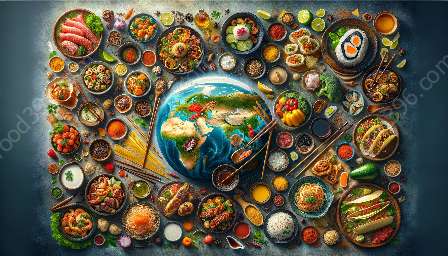As humans, we experience the world through our senses, and one of the most profound ways we connect with our surroundings is through food. In this article, we will delve into the concept of food and identity, exploring how different cuisines around the world reflect cultural, social, and personal identities. We will examine the intricate connections between what we eat and who we are, shedding light on the fascinating interplay between food and human identity.
The world on a plate
Food is not merely a source of sustenance; it is a cultural artifact that carries the heritage, traditions, and history of a community. The diversity of world cuisines provides a rich tapestry of flavors, ingredients, and culinary practices, each offering a glimpse into the identity of the people who created them. From the fragrant spices of Indian cuisine to the delicate artistry of Japanese sushi, every dish tells a story of a particular culture and its values.
Cultural reflections
At the heart of food and identity lies the reflection of cultural values and traditions. The flavors, cooking techniques, and ingredients used in a particular cuisine often mirror the history and ethos of a society. For example, the use of aromatic herbs and spices in Middle Eastern cuisine reflects the region's historical trade routes and the influence of various civilizations, while the emphasis on freshness and simplicity in Mediterranean cooking embodies the region's focus on healthy, natural ingredients.
Furthermore, the act of sharing meals and recipes within a community serves as a way to preserve and pass on cultural traditions from one generation to the next. Food becomes a tangible link to the past, connecting individuals to their roots and heritage.
Social bonds
Food also plays a pivotal role in shaping social identities and fostering connections within communities. The communal act of preparing and sharing meals brings people together, creating opportunities for social interaction, storytelling, and the strengthening of bonds. In many cultures, traditional meals are the centerpiece of family gatherings, religious celebrations, and social events, serving as a means of reinforcing social ties and affirming a sense of belonging.
Personal narratives
On a personal level, our food choices and eating habits are deeply intertwined with our individual identities. The foods we consume often reflect our upbringing, beliefs, and personal preferences, shaping our sense of self and belonging. Whether it's the comfort of a beloved family recipe or the exploration of new culinary experiences, our relationship with food is a dynamic expression of who we are as individuals.
Comparative study of world cuisines
Through a comparative study of world cuisines, we can gain valuable insights into the diverse ways in which food and identity intersect across different cultures. By examining the similarities and differences in culinary practices, flavors, and food-related rituals, we can appreciate the universal themes of human identity while celebrating the uniqueness of each cultural expression.
For instance, comparing the staple foods of various regions—such as rice in Asian cuisines, maize in Latin American dishes, and wheat in European fare—illuminates the agricultural, historical, and geographical influences that have shaped these culinary traditions. Similarly, exploring the symbolism of certain ingredients or dishes in different cultures reveals how food can carry deep meanings related to spirituality, social status, and historical events.
The evolving landscape of food and identity
As our world becomes increasingly interconnected, the relationship between food and identity continues to evolve. Globalization, migration, and the cross-pollination of culinary traditions have led to the fusion of diverse flavors and the emergence of new food identities. Today, individuals have access to a global pantry of ingredients and recipes, allowing for the creation of personal food narratives that reflect a blend of cultural influences and individual choices.
A call for cultural appreciation
While celebrating the diversity of world cuisines, it is essential to approach the exploration of food and identity with cultural sensitivity and respect. Acknowledging the historical, social, and political contexts behind different culinary practices fosters a deeper appreciation for the richness of food traditions and the stories they encapsulate. By understanding the intricate relationship between food and identity, we can cultivate empathy, bridge cultural divides, and honor the distinct culinary heritages that contribute to the mosaic of human identity.
Conclusion
Food is far more than sustenance; it is a portal to the soul of a culture, a vessel for social connection, and a canvas for personal expression. Whether through the traditions of a family meal, the exploration of global cuisines, or the sharing of culinary stories, food weaves a tapestry of identity that transcends geographical borders and speaks to the universal human experience.

